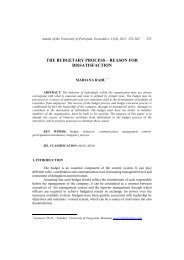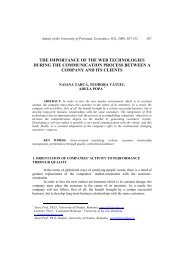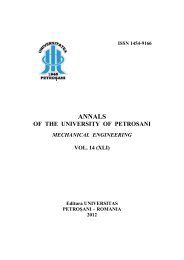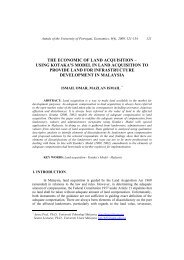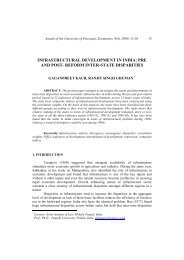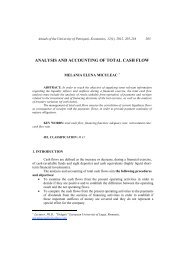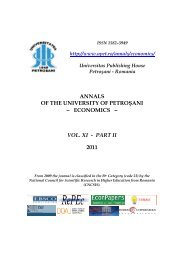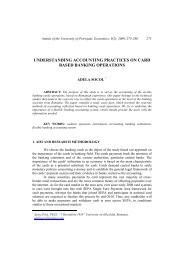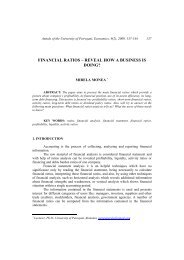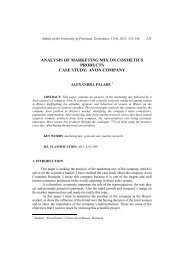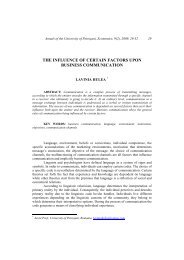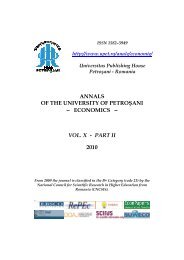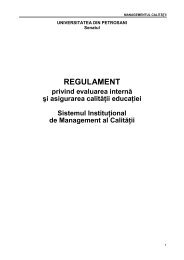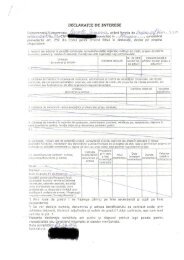annals of the university of petroÅani â¼ economics â¼ vol. xi - part i ...
annals of the university of petroÅani â¼ economics â¼ vol. xi - part i ...
annals of the university of petroÅani â¼ economics â¼ vol. xi - part i ...
Create successful ePaper yourself
Turn your PDF publications into a flip-book with our unique Google optimized e-Paper software.
52 Cenar, I.<br />
tougher because <strong>the</strong> information explosion makes <strong>the</strong> assimilation <strong>of</strong> <strong>the</strong> content <strong>of</strong> a<br />
multitude <strong>of</strong> publications uncertain, even more so as <strong>the</strong> quality <strong>of</strong> scientific research is<br />
in tandem with time pressure and growing requirements regarding <strong>the</strong>ir qualitative<br />
level.<br />
Accounting, as a major area <strong>of</strong> scientific and practical concerns, deals with<br />
preparing, interpreting and using financial information and o<strong>the</strong>r crucial economic<br />
information to manage and assess <strong>the</strong> organization’s activities (Andone, et. al., 2011).<br />
At <strong>the</strong> root <strong>of</strong> improving human condition is knowledge (including in<br />
accounting) built on <strong>the</strong> reasoning <strong>of</strong> those who wish to understand and govern better<br />
<strong>the</strong> world behind <strong>the</strong> accounting figures.<br />
The e<strong>xi</strong>stence and development <strong>of</strong> accounting start from observed facts and<br />
stop at its <strong>the</strong>oretical ideas. Methodology is interposed between <strong>the</strong>m as an organized<br />
ensemble <strong>of</strong> intellectual persuasion, which operates in transforming <strong>the</strong> research object<br />
into scientific ideas.<br />
2. RELATIONSHIPS AND FORMS OF SCIENTIFIC RESEARCH IN<br />
ACCOUNTING<br />
Considering <strong>the</strong> o<strong>the</strong>r areas <strong>of</strong> scientific knowledge or <strong>of</strong> <strong>the</strong> socioeconomic<br />
context, contemporary accounting research doesn’t go through a selfsufficient<br />
type <strong>of</strong> development.<br />
Research in accounting has been more influenced by o<strong>the</strong>r social sciences<br />
(such as economy, psychology and sociology) than <strong>the</strong> o<strong>the</strong>r way around.<br />
Accounting researches have <strong>the</strong> tendency to borrow models, metaphors and<br />
methods from o<strong>the</strong>r scientific disciplines that have a prestige measured through<br />
<strong>the</strong> advertising space in journals and <strong>the</strong> allocated funds for research.<br />
Consequently, economy, ma<strong>the</strong>matics, psychology and sociology have started to<br />
become models for <strong>the</strong> contemporary accounting researcher.<br />
In turn, accounting is (or could be) a subject <strong>of</strong> interest for research in<br />
o<strong>the</strong>r fields, such as anthropology and sociology, which study human behaviour,<br />
accounting being a human activity, practiced by accountants. Many discussions in<br />
accounting have a philosophical interest and concepts like pr<strong>of</strong>it, accurate picture<br />
and business continuity are (also) philosophical concepts.<br />
Accounting is a specific system <strong>of</strong> information because <strong>of</strong> its multiple<br />
valences, among which are included: providing real, comparable, syn<strong>the</strong>tic and<br />
analytical information for <strong>the</strong> analysis <strong>of</strong> various aspects taken on by economic<br />
phenomena; communicating information starting with <strong>the</strong> moment <strong>of</strong> occurrence<br />
and ending with its use; enhancing <strong>the</strong> control function regarding economic<br />
phenomena; <strong>the</strong> considerable growth <strong>of</strong> <strong>the</strong> provisional role, etc.<br />
Any act <strong>of</strong> knowledge has a very broad feature. The science regarded as<br />
a form <strong>of</strong> specialized knowledge, strictly focused on a certain field, is a clearly<br />
circumscribed “<strong>part</strong>” <strong>of</strong> <strong>the</strong> general framework <strong>of</strong> knowledge.<br />
Science represents <strong>the</strong> organized body <strong>of</strong> data that shows <strong>the</strong> objective and<br />
subjective knowledge <strong>of</strong> reality, organized in a coherent, intelligible and tidily system<br />
according to a system in perfect tune with logical principles (Enachescu, 2007). It aims



